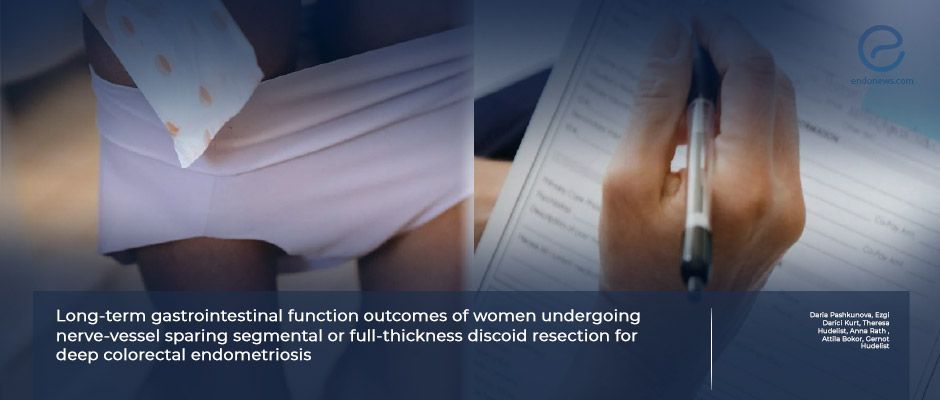Discoid or Segmental? GI Symptom Recovery Compared
Jun 5, 2025
Segmental Resection Offers Superior Symptom Control, but GI Quality of Life Remains Comparable
Key Points
Highlights:
- Nerve-vessel-sparing segmental resection for the treatment of deep colorectal endometriosis leads to better gastrointestinal symptom control in the long term.
- There is no difference between nerve-vessel-sparing segmental resection and full-thickness discoid resection in terms of gastrointestinal symptom control in the long term based on the Gastrointestinal Quality of Life Index.
Importance:
- Deep colorectal endometriosis often requires invasive surgical intervention, but the optimal technique remains debated.
- Understanding long-term functional outcomes—not just anatomical success—is essential for guiding surgical strategy and informed patient consent.
- This study focuses on how nerve-vessel-sparing segmental resection compares with full-thickness discoid excision in real-world gastrointestinal symptom control.
What’s done here:
- This retrospective cohort study followed 74 women with deep colorectal endometriosis who underwent either segmental resection (n=38) or full-thickness discoid resection (n=36)
- Median follow-up was 64 months (range: 39–90 months).
- Outcomes were assessed using the Gastrointestinal Quality of Life Index (GIQLI) and a tailored gastrointestinal symptom questionnaire.
Key results
- 45.7% of patients had symptoms resembling lower anterior resection syndrome.
- 48.7% of those who had nerve-vessel-sparing segmental resection and 31.3% of those who had full-thickness discoid resection had these symptoms.
- Patients who had nerve-vessel-sparing segmental resection had a significant reduction in lower anterior resection syndrome-like symptoms 5 years after the operation compared to before.
- There were differences in symptoms 1 and 5 years after nerve-vessel-sparing segmental resection.
- There was no statistical difference in the lower anterior resection syndrome score before the operation and 5 years later in patients who had full-thickness discoid resection.
- The GIQLI improved both 1 and 5 years following both procedures compared to before the operation.
Limitations:
- The rate of loss to follow-up was high at 24%.
- The number of patients who had full-thickness discoid resection was low compared to those who had segmental resection.
From the Editor-in-Chief – EndoNews
"In bowel endometriosis surgery, the success of an approach should not be judged by anatomical outcomes alone.
This long-term study reminds us that nerve-sparing segmental resection may offer real functional advantages, even when global quality-of-life scores appear similar. As clinicians, we must ask the right questions—not just “how is your quality of life,” but “can you defecate without pain?”
Surgical choices must reflect not only disease severity but the lived experience of the patient."
Lay Summary
A new study published in Acta Obstetricia et Gynecologica Scandinavica has found that nerve- and vessel-sparing segmental resection for deep colorectal endometriosis leads to better long-term gastrointestinal function compared to full-thickness discoid resection. While both surgeries initially improve symptoms, only the segmental resection appears to maintain that improvement over time.
Researchers followed 92 women who underwent either segmental or discoid resection between 2017 and 2022. They evaluated outcomes using both the Gastrointestinal Quality of Life Index (GIQLI) and a questionnaire assessing symptoms similar to lower anterior resection syndrome (LARS)—a condition marked by frequent bowel movements, urgency, incontinence, and incomplete evacuation.
Although overall GIQLI scores improved after both procedures and remained stable over five years, patients who had segmental resection experienced a significant and lasting reduction in LARS-like symptoms. In contrast, those who had discoid resection showed short-term improvement, but symptoms gradually returned to pre-surgery levels over five years.
Interestingly, nearly 46% of all patients experienced LARS-like symptoms, with higher rates in the segmental group (48.7%) compared to the discoid group (31.3%). However, only the segmental group saw a sustained reduction in those symptoms over time.
These findings suggest that patient-reported outcomes like LARS symptoms may offer a more sensitive view of long-term recovery than broad quality-of-life indices alone. The study underscores the importance of selecting surgical techniques not just for anatomical success, but for preserving functional well-being in the long term.

